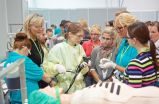A legal trade in horn would improve rhino protection and help sustainable development
2014-10-21
(Press-News.org) The extinction in the wild of the southern white rhino population could be prevented by letting local communities take responsibility of the animals and giving them permission to harvest horns in a controlled manner through a legal trade. Rhino horn is made of the same material as human hair and fingernails and grows back in 2–3 years.
In 2013, more than 1000 rhinos were killed illegally for their horns in South Africa. Rhino horns are being used in Asia for traditional Chinese medicine and personal prestige. Now, a new study based on ecological and socio-economic models has found that the white rhino population in South Africa could go extinct in the wild in less than 20 years unless anti-poaching effort and monetary fines are increased to levels that would deter poachers. South Africa is more or less the only place where the white rhino remains in the wild.
The funding for rhino protection could be generated by a legal trade in rhino horn - something that has been banned since 1977.
"Our results suggest that enhancing rhino protection to levels that will discourage poaching will require raising tens of millions of dollars year after year just for rhino conservation when endless other uses for conservation resources exist," says Enrico Di Minin, research fellow at the University of Helsinki, Finland.
"The funding generated from a legal trade in rhino horn, instead, could be used to cover protection costs of rhino and other biodiversity and to generate sustainable income to poor local communities," he continues.
"Rhino horn could be harvested from individuals that die of natural causes; it can also be harvested from live animals with minimum risk to the rhinos, as the horn is compressed hair, and it grows back if harvested," says Atte Moilanen, Professor at the University of Helsinki.
Yet, the authors of the study, including conservation scientists and practitioners from South Africa, Finland and the United Kingdom, warn on potential pitfalls. "Policy-makers in South Africa should be careful in advocating to lift a 35 year-old ban on rhino horn products unless the funding generated from the trade is re-invested in improved protection of the rhino population," says Rob Slotow, Professor at the University of KwaZulu-Natal.
"An important contribution that the legal trade could make is to cover enhanced protection costs, at least in the short term, until other measures over some longer period lead to a reduction in demand from users in the Far East", concludes Di Minin.
INFORMATION:
[Attachments] See images for this press release:

ELSE PRESS RELEASES FROM THIS DATE:
2014-10-21
NASA's newest orbiter at Mars, MAVEN, took precautions to avoid harm from a dust-spewing comet that flew near Mars today and is studying the flyby's effects on the Red Planet's atmosphere.
The MAVEN spacecraft -- full name Mars Atmosphere and Volatile Evolution -- reported back to Earth in good health after about three hours of precautions against a possible collision with high-velocity dust particles released by comet C/2013 A1 Siding Spring.
"We're glad the spacecraft came through, we're excited to complete our observations of how the comet affects Mars, and we're ...
2014-10-21
October 20, 2014 – (BRONX, NY) – Rates of depression and anxiety vary widely among different segments of the U.S. Hispanic and Latino population, with the highest prevalence of depressive symptoms in Puerto Ricans, according to a new report from Albert Einstein College of Medicine of Yeshiva University and the Hispanic Community Health Study/Study of Latinos (HCHS/SOL). The researchers' findings also suggest that depression and anxiety may be undertreated among Hispanics and Latinos, particularly if they are uninsured. The study was published online in Annals ...
2014-10-21
Our species' waking and sleeping cycles – shaped in millions of years of evolution – have been turned upside down within a single century with the advent of electric lighting and airplanes. As a result, millions of people regularly disrupt their biological clocks – for example, shift workers and frequent flyers – and these have been known to be at high risk for such common metabolic diseases as obesity, diabetes and heart disease. A new study published in Cell, led by Weizmann Institute scientists, reveals for the first time that our biological clocks ...
2014-10-21
Bethesda, MD (Oct. 21, 2014) — If you are not getting the recommended seven-to-eight hours of sleep each night, you may be at increased risk of developing ulcerative colitis, according to a new study1 in Clinical Gastroenterology and Hepatology, the official clinical practice journal of the American Gastroenterological Association.
"Both short and long durations of sleep have important health implications and are associated with increased overall mortality, cardiovascular disease and cancer," said lead study author Ashwin N. Ananthakrishnan, MD, MPH, Massachusetts ...
2014-10-21
A team of UC San Francisco researchers has found that a tiny segment of genetic material known as a microRNA plays a central role in the transition from moderate drinking to binge drinking and other alcohol use disorders.
Previous research in the UCSF laboratory of Dorit Ron, PhD, Endowed Chair of Cell Biology of Addiction in Neurology, has demonstrated that the level of a protein known as brain-derived neurotrophic factor, or BDNF, is increased in the brain when alcohol consumed in moderation. In turn, experiments in Ron's lab have shown, BDNF prevents the development ...
2014-10-21
(Vienna, October 21, 2014) Patients with irritable bowel syndrome (IBS) may at last be able to hope for a brighter future as innovative new treatments emerge and researchers clarify the role of current therapies. Dr Alexander C. Ford from the Leeds Gastroenterology Institute in Leeds, UK, tells journalists attending the 22nd United European Gastroenterology Week (UEG Week 2014) in Vienna, Austria, that significant progress was being made in drug development for IBS, thanks to the intense research efforts of scientists around the world. "Researchers have dedicated many years ...
2014-10-21
A new study shows that survival and neurological outcomes for patients in cardiac arrest can be improved by adding extracorporeal membrane oxygenation (ECMO) when performing cardiopulmonary resuscitation (CPR). The study abstract was released today in an online supplement of the journal CHEST and will be presented at CHEST 2014, the annual meeting of the American College of Chest Physicians in Austin, Texas held October 25-30.
Despite advances in medical care, less than 20% of people who experience a cardiac arrest make a full recovery. An alternate approach to traditional ...
2014-10-21
PROVIDENCE, R.I. [Brown University] — Scientists think of CD8 T cells as long-lived cells that become tuned to fight just one pathogen, but a new study finds that once CD8 T cells fight one pathogen, they also join the body's "innate" immune system, ready to answer the calls of the cytokine signals that are set off by a wide variety of infections.
Think of CD8 T cells as soldiers who are drafted and trained for a specific mission, but who stay in service, fighting a variety of enemies throughout a long career.
CD8 T cells therefore have more utility than researchers ...
2014-10-21
Eliminating subsidies that help low- and moderate-income people purchase coverage through government-run health insurance marketplaces would sharply boost costs for consumers and cause more than 11 million Americans to lose their health insurance, according to a new RAND Corporation study.
Modeling the likely effects of ending subsidies offered to individuals under the federal Affordable Care Act, researchers found that such a move would increase premium costs in the individual marketplaces by as much as 43 percent and cause enrollment to drop by 68 percent.
"If subsidies ...
2014-10-21
Two Michigan high school students, sisters Ilina and Medha Krishen, have developed screening tools using electronic stethoscopes to detect lung and heart disease. The sisters will present their findings at CHEST 2014 in Austin, Texas next week.
Ilina Krishen became aware of the dangers of smoking and chemical air pollution when she saw the effects of lung disease on family members. Curious to find a way to detect early lung damage in people exposed to noxious air pollutants, Ilina, a high school senior at Port Huron Northern High School in Michigan, developed a screening ...
LAST 30 PRESS RELEASES:
[Press-News.org] A legal trade in horn would improve rhino protection and help sustainable development



